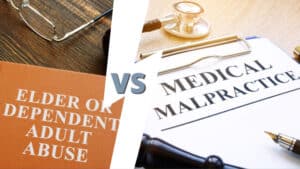
This week’s question comes from Linda in the North Bay. She asks, “Chris, last fall, my brother and I helped our mother enter a nursing care facility. It was a nightmare. The food was so poor she became malnourished and didn’t drink enough water. Mom stayed in bed for most of the day and developed painful skin lesions. We removed her from the facility, but they refused to take any responsibility. Instead, they claimed we were being ‘overly sensitive.’ Can my mom sue the facility for the deficient care?”
Linda, I hope your mother has recovered and is now at a nursing home providing her with excellent and compassionate care.
You are right to want to hold the facility accountable. I appreciate how upsetting it is to learn the people you entrusted your mother’s care with put her life at risk.
Editor’s Note: A full listing of the types of abuse and neglect that seniors may experience at care facilities can be found on our elder abuse and neglect page. We also have a free booklet summarizing California law protecting seniors from abuse and the rights of seniors in care facilities.
With increases in life expectancy, the U.S. Census Bureau now considers age 90 as the start of the oldest segment of the U.S. population. In 2010, almost 2 million Americans were age 90 and over. By 2050, the number of Americans age 90 and over is projected to grow to more than 8 million, and 20 percent of the U.S. population will be age 65 and over.
While many dedicated professionals work at residential care facilities for the elderly, the increase in the number of seniors in America has sadly resulted in greater elder abuse – financial, emotional and physical – and neglect.
Where there is a profit motive, facilities cut expenses and services to improve their bottom line.
California law provides several types of claims that a patient – or surviving heirs if the patient has died – may bring. The Elder Abuse Act applies when it “is proven by clear and convincing evidence that a defendant is liable for physical abuse … or neglect … or fiduciary abuse … [of an elderly or dependent adult], and that the defendant has been guilty of recklessness, oppression, fraud, or malice in the commission of this abuse.”
Recognizing that regulation by public agencies is insufficient to safeguard the elderly, the legislature provided under the Elder Abuse Act enhanced remedies to encourage patients and their families to bring civil lawsuits to stop elder abuse and neglect.
Likewise, a current or former resident or patient of a skilled nursing facility may bring civil action against a facility that violates any rights of the resident or patient. These rights include ones that were denied your mother:
– A facility shall employ an adequate number of qualified personnel to carry out all of the functions of the facility.
– Each patient shall show evidence of good personal hygiene and be given care to prevent bedsores, and measures shall be used to prevent and reduce incontinence for each patient.
– The facility shall provide food of the quality and quantity to meet the patients’ needs in accordance with physicians’ orders.
Linda, this is just a brief overview of the statutory claims your mother, with your assistance, may be able bring against the facility. You may also have claims against the facility for negligence and fraud.
Please save all documentation you have concerning this facility, including copies of any agreements you or your mother signed when she was admitted as well as any brochures and other marketing material you received from the nursing home.
Keep in mind, the facility may have sought to deprive your mother of her right to bring a civil action by inserting an arbitration clause into the admissions agreement. This contract language requires that any disputes be heard by an arbitrator, not by a judge and jury.
Arbitration is fundamentally unfair to individuals and consumers. With arbitration, the corporate defendant almost always wins because the arbitrator is paid for by the corporate defendant.
Under California law, nursing homes cannot require applicants or residents to sign an arbitration agreement as a condition of admission or medical treatment. I recommend no one ever agree to arbitration.
You may also wish to file a complaint with the California Department of Public Health, which oversees nursing homes in the state. The department operates a website, called the Health Facilities Consumer Information System, which provides information on long-term care facilities and hospitals across the state. You can also call one of the department’s district offices in your region for further information.
If you and your mother wish to pursue legal action, given the complexity of this area of the law, I suggest you contact a qualified trial lawyer to review your case.
By attorney Christopher B. Dolan, owner of the Dolan Law Firm. Email Chris questions and topics for future articles to help@dolanlawfirm.com









